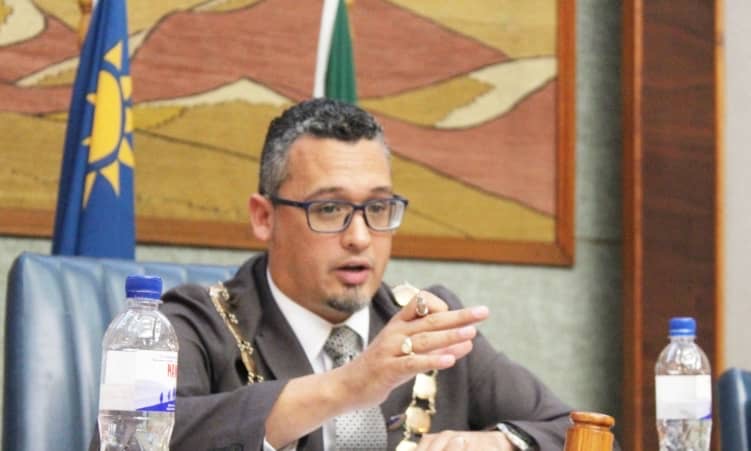FEW would doubt the sincerity and the noble objectives of the founders of the ruling party, Swapo.
However, as the years after Independence wear on, we are in a conundrum about the generous foundations of Swapo. To put it crudely, Swapo seems to be retreating from those foundations as a consequence of stubbornness in adapting its method.Political parties, as a rule, rise and fall in democracies.Thus, stating the historically obvious, within time and space, the ruling party, Swapo, will fall, either under the weight of its own internal contradictions or the emergence of another hegemonic formation in our national politics.Such a process could take decades, or even a century, but it is an inevitable rule in contested democratic politics.Certainly, political parties want to remain in power for as long as they can.Yet we should also argue the damage of a power at all costs approach prevalent in African politics.That would be the argument of the social scientist.If one would argue as a political consultant or strategist, one would be asking the question as to how Swapo can remain relevant and hegemonic for a good number of years still within our democratic space.On this score, and largely as a consequence of a relevant diagnosis and perhaps an optimistic panacea, I would argue for the party to mint the new comrade.I argue this way because if we have to define the problem of Swapo today and the threat to its longevity in power, it is one for the comrades and their self-definition, not only as individuals, but also as collective bearers of certain noble ideals of the Party.Most importantly this self-definition must be conceptualised in the context of what it means to be Namibian: a young country founded on the rule of law and not the rule of man.Broadly, but crucially it is also about the Weltanschaung (worldview) of comrades.Alas, much of the current intonation, notably from the Youth League and some radical sections of the Party, tends to annihilate the very essence of the republican ideal in favour of the ghastly rule of man.This political dialogue within the party or the absence thereof was minted in an era of division, rather than one of consensus.The discourse is excessively emotional and borders on existential rebellion.Yet, the point should be made that in a democratic society, we arrive at reasonable decisions when we reflect, and we arrive at bad ones when we act out of emotions.Political parties are by their nature plural entities in terms of the articulation of ideas.On this, Swapo has become too sectarian, with few consistent alternative voices.The pitfalls of this sectarian reasoning amongst comrades is what eventually led to the formation of the RDP.And it is this context pitting sections of the youth against top leaders, not on the issues, but petty political stuff.Overwhelmingly, this context calls for the new comrade to emerge.The pertinent question is: who or what is the new comrade? Contrary to a long intellectual tradition from Aristotle to William James opposing emotions and reason in their work on politics, George E Marcus argues convincingly in his book ‘Le Citoyen Sentimental: Emotions et politique en dŽmocratie’, that the two are quite complementary.He concludes that the ‘sentimental citizen’ is one who exercises his judgment better and translates it in coherent choices.Reason in a democracy is defined as the ability to deliberate issues independently, even within the framework of the collective.It is at this task where the Party is failing.It must seek to generalise a certain degree of political sophistication and also develop among comrades the capacity for intellectual reasoning.The more the comrades adopt a complex approach to politics, the more they are likely to attach importance to abstract reflections to determine their political choices.It is in fact the challenge of the new comrade today, to exercise his or her judgment better.Essentially what this may mean is that it should not be enough for us to mimic our favoured leaders; try as hard as we will to sound and act like them.The new comrade is not just about wrapping himself or herself in Party colours and singing Ngatu uane Namibia at the top of their lungs.He or she is not just about boasting how well-grounded the family is in the Party, thereby seeking to translate that into contracts and jobs.Additionally, the new comrade must learn to think with President Pohamba, with Hage Geingob, Nahas Angula or with Elijah Ngurare.But most importantly, the new comrade must learn to think against them.Issues must be argued on their merits and not necessarily on narrow tactical political calculations.The new comrade is also one who believes in breaking idols and the idolatry of leaders.After all, breaking idols is the sine qua non condition for free thinking.It is also the new comrade who must remind others that the fight for liberty meant that rights must be exercised, including the right to differ respectfully with others, including leaders, on the issues.Crucially, minting the new comrade demands that the top leadership takes an active interest in the transformation process of the party.It must build consensus on this issue.Failing to do so is likely to lead to the emergence of self-serving comrades, whose actions border on hooliganism or what the leading South African public intellectual Xolela Mangcu refers to as the ‘comrade tsotsi’.To conclude, the process of minting the new comrade may take time, but for a Party going through a mutation whose consequences are unknown, minting the new comrade should be seen as urgent and inevitable.* Alfredo Tjiurimo Hengari is a PhD fellow in political science at the University of Paris-Panthéon Sorbonne, France.To put it crudely, Swapo seems to be retreating from those foundations as a consequence of stubbornness in adapting its method.Political parties, as a rule, rise and fall in democracies.Thus, stating the historically obvious, within time and space, the ruling party, Swapo, will fall, either under the weight of its own internal contradictions or the emergence of another hegemonic formation in our national politics.Such a process could take decades, or even a century, but it is an inevitable rule in contested democratic politics.Certainly, political parties want to remain in power for as long as they can.Yet we should also argue the damage of a power at all costs approach prevalent in African politics.That would be the argument of the social scientist.If one would argue as a political consultant or strategist, one would be asking the question as to how Swapo can remain relevant and hegemonic for a good number of years still within our democratic space.On this score, and largely as a consequence of a relevant diagnosis and perhaps an optimistic panacea, I would argue for the party to mint the new comrade.I argue this way because if we have to define the problem of Swapo today and the threat to its longevity in power, it is one for the comrades and their self-definition, not only as individuals, but also as collective bearers of certain noble ideals of the Party.Most importantly this self-definition must be conceptualised in the context of what it means to be Namibian: a young country founded on the rule of law and not the rule of man.Broadly, but crucially it is also about the Weltanschaung (worldview) of comrades.Alas, much of the current intonation, notably from the Youth League and some radical sections of the Party, tends to annihilate the very essence of the republican ideal in favour of the ghastly rule of man.This political dialogue within the party or the absence thereof was minted in an era of division, rather than one of consensus.The discourse is excessively emotional and borders on existential rebellion.Yet, the point should be made that in a democratic society, we arrive at reasonable decisions when we reflect, and we arrive at bad ones when we act out of emotions.Political parties are by their nature plural entities in terms of the articulation of ideas.On this, Swapo has become too sectarian, with few consistent alternative voices.The pitfalls of this sectarian reasoning amongst comrades is what eventually led to the formation of the RDP.And it is this context pitting sections of the youth against top leaders, not on the issues, but petty political stuff.Overwhelmingly, this context calls for the new comrade to emerge.The pertinent question is: who or what is the new comrade? Contrary to a long intellectual tradition from Aristotle to William James opposing emotions and reason in their work on politics, George E Marcus argues convincingly in his book ‘Le Citoyen Sentimental: Emotions et politique en dŽmocratie’, that the two are quite complementary.He concludes that the ‘sentimental citizen’ is one who exercises his judgment better and translates it in coherent choices.Reason in a democracy is defined as the ability to deliberate issues independently, even within the framework of the collective.It is at this task where the Party is failing.It must seek to generalise a certain degree of political sophistication and also develop among comrades the capacity for intellectual reasoning.The more the comrades adopt a complex approach to politics, the more they are likely to attach importance to abstract reflections to determine their political choices.It is in fact the challenge of the new comrade today, to exercise his or her judgment better.Essentially what this may mean is that it should not be enough for us to mimic our favoured leaders; try as hard as we will to sound and act like them.The new comrade is not just about wrapping himself or herself in Party colours and singing Ngatu uane Namibia at the top of their lungs.He or she is not just about boasting how well-grounded the family is in the Party, thereby seeking to translate that into contracts and jobs.Additionally, the new comrade must learn to think with President Pohamba, with Hage Geingob, Nahas Angula or with Elijah Ngurare.But most importantly, the new comrade must learn to think against them.Issues must be argued on their merits and not necessarily on narrow tactical political calculations.The new comrade is also one who believes in breaking idols and the idolatry of leaders.After all, breaking idols is the sine qua non condition for free thinking.It is also the new comrade who must remind others that the fight for liberty meant that rights must be exercised, including the right to differ respectfully with others, including leaders, on the issues.Crucially, minting the new comrade demands that the top leadership takes an active interest in the transformation process of the party.It must build consensus on this issue.Failing to do so is likely to lead to the emergence of self-serving comrades, whose actions border on hooliganism or what the leading South African public intellectual Xolela Mangcu refers to as the ‘comrade tsotsi’.To conclude, the process of minting the new comrade may take time, but for a Party going through a mutation whose consequences are unknown, minting the new comrade should be seen as urgent and inevitable.* Alfredo Tjiurimo Hengari is a PhD fellow in political science at the University of Paris-Panthéon Sorbonne, France.
Stay informed with The Namibian – your source for credible journalism. Get in-depth reporting and opinions for
only N$85 a month. Invest in journalism, invest in democracy –
Subscribe Now!










